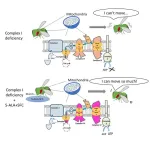(Press-News.org) ‘Routine’ infanticide of newborns by married parents in early modern Europe was a much more widespread practice than previously thought, a new book posits.
This fresh insight sits at the heart of a new book, Death Control in the West 1500–1800: Sex Ratios at Baptism in Italy, France and England, by Gregory Hanlon and contributors.
The French-trained behavioural historian explains: “In most cases, infanticide was a crime leaving no aggrieved party seeking revenge if it was committed right away. It could be overlooked and forgotten with the passage of time.”
Widespread infanticide
Hanlon, who is Distinguished Research Professor at Dalhousie University in Canada, calls attention to the limited scope of existing scholarship, which has never focused on sex ratios of infants brought for baptism within hours or days after their birth.
These records reveal startling spikes in the number of male baptisms in the aftermath of famines or diseases.
He notes: “Historians in the West have relied almost exclusively on records of criminal trials in which unwed mothers or married women carrying progeny not sired by their husbands hid their pregnancies and killed their newborns alone or with female accomplices. Married infanticidal mothers may have been a hundred times more numerous.”
Hanlon’s research suggests that in rural Tuscany at the height of infanticide the victims might have constituted up to a third of the total number of live births.
Beyond the lone woman perpetrator
Using baptismal registers and ecclesiastical censuses drawn from scores of parishes in Italy, France and England, Hanlon shows similar infanticide patterns across city and country, for Catholics, Calvinists and Anglicans alike.
In Italy’s rural 17th century Tuscany, Hanlon suggests that parents seemed willing to sacrifice a child if they were a twin, opting to keep just one of the newborns. In the north Italian city of Parma, Laura Hynes Jenkins found that working-class parents preferred girls over boys.
Contributor Dominic J. Rossi finds a clear pattern of a preference for girls in the French town of Villeneuve-sur-Lot after 1650.
Rossi – one of the five former students who contributes to the book – posits the idea that ‘the lower-status families would want to marry their daughters up at the same time as economic conditions allowed them to make long-term plans for social movement’.
Meanwhile Evan Johnson, another contributor, finds evidence to demonstrate that upper-class parents in rural Mézin showed a clear preference for keeping newborn males.
Infanticide within the contemporary
Death Control in the West 1500-1800 shines a light on the many infants whose existence went unrecorded and whose deaths remained unpunished.
Hanlon calls attention to lax punitive measures taken for crimes of infanticide, and notes: “Tribunals operated against single mothers almost exclusively, but only if they killed the newborn deliberately. Simple abandonment was not a comparable offense.”
The roles of the state and criminal justice system are rigorously examined in the study, alongside realities of poverty and social class structures. The book draws parallels between histories of infanticide and present discussions of reproductive rights.
“Infanticide is murder, of course, but people did not consider this murder to be a crime,” explains Hanlon, who says ‘most people could live with it as an unpleasant fact of life’.
Together, Hanlon and his contributors invite readers to reckon with infanticide beyond a moralistic approach, in order to understand the social practice’s ramifications for our present times.
END
New findings suggest historical infanticide in Europe likely more widespread than estimated
New study examines selective infanticide within European communities as a means of controlling resources and social status in Italy, France and England
2023-07-17
ELSE PRESS RELEASES FROM THIS DATE:
Prescribing psychostimulants for people at risk of overdose
2023-07-17
Growing evidence supports prescribing psychostimulant medications to help reduce use of illegal stimulants such as methamphetamine, authors write in a CMAJ (Canadian Medical Association Journal) commentaryhttps://www.cmaj.ca/lookup/doi/10.1503/cmaj.230266.
Illegal stimulant use is rising, judging by the presence of these drugs in at least half of all opioid deaths in Canada in 2022.
Following evidence from clinical trials in Australia, Europe and the United States, physicians and nurse practitioners in Canada and other countries are increasingly prescribing psychostimulants as harm reduction for stimulant use disorder.
"This emerging ...
THE LANCET ONCOLOGY: Cancer experts call for cancer care to be centred on patients rather than the commercial bottom-line
2023-07-17
Commercial, rather than patient interests, often drive cancer care and research and patients deserve better, argue a group of global oncologists and patient advocates in a Comment published in The Lancet Oncology journal. The authors also establish core guidelines for the development of a new patient-centred movement in cancer care - Common Sense Oncology.
The Comment says there has been a shift over the past few decades from predominantly publicly funded clinical trials designed to answer questions important to patients, to industry-funded trials which aim to achieve ...
Significant rise in ADHD diagnoses in the UK
2023-07-17
Both ADHD diagnoses and prescriptions for ADHD medication have increased significantly over the past two decades, except in children under five, finds a new study by UCL researchers.
The research, published in BJPsych Open, reviewed data from 7 million individuals aged three to 99, from IQVIA Medical Research Data, a UK primary care database, between 2000 and 2018.
Of these individuals, 35,877 had an ADHD diagnosis and 18,518 received prescriptions for ADHD medication from their GP.
Although the number of individuals receiving medication for ADHD is still relatively low, the researchers found ...
New guidelines for diagnosing Alzheimer's
2023-07-16
Today at the International Alzheimer's Congress (AAIC) in Amsterdam, new guidelines for diagnosing Alzheimer's disease developed by clinicians and researchers from around the world were presented. In these criteria, the disease is diagnosed in the clinic through the use of blood biomarkers, just as with other major diseases such as diabetes and cardiovascular disease.
A blood test has been developed for this purpose in recent years that gives very good results, according to recent research. Charlotte Teunissen, professor of neurochemistry at Amsterdam ...
Discovery could lead to more treatments to prevent cancer and infectious diseases
2023-07-16
Researchers have cracked how a particular type of immune cell develops in the body and protects against infection and disease. And the discovery could help in the development of more preventive treatments, according to a new study.
The research, led by Murdoch Children’s Research Institute and Federation University Australia, has uncovered how these specialised white blood cells operate and can produce an immune response.
Associate Professor Dan Pellicci said by understanding the function of these cells, they could be harnessed to help prevent cancer and highly infectious diseases such as ...
Unimolecular reactions of anti-glycolaldehyde oxide and its reactions with one and two water molecules
2023-07-15
Criegee intermediates are produced in the ozonolysis of unsaturated compounds in the atmosphere. These intermediates are especially importanct because they contribute to the formation of OH radical during the night and to formation of secondary organic aerosols. The OH radicals increase the oxidative capacity of the atmosphere, and the aerosols may reflect or absorb sunlight and contribute to cloud formation. Criegee intermediates also lay key roles in conversion of sulfur dioxide into sulfur trioxide, finally resulting in the formation ...
5-aminolevulinic acid might help fight mitochondrial disorders
2023-07-15
Tokyo, Japan – Scientists from Tokyo Metropolitan University have shown that 5-aminolevulinic acid (5-ALA) helps bypass deficiencies in Complex I (CI), the first in a series of protein complexes that transport electrons and help power the mitochondria. They showed that fruit flies missing the analogous protein showed improved health when given a cocktail of drugs including 5-ALA. CI deficiency is responsible for the majority of mitochondrial disorders; the team’s findings might lead to new therapies.
Mitochondrial diseases arise from problems in the mitochondria, a small organelle in cells which produces adenosine triphosphate (ATP), ...
Mobile app enables students with special needs to self-monitor behavior, focus more in class
2023-07-14
COLUMBIA, Mo. -- When Sara Estrapala started her career as a high school paraeducator supporting students with disabilities such as autism, down syndrome, learning disorders and challenging behaviors, she quickly recognized a challenge — her teenage students desire to make their own decisions and their teachers’ struggle to keep them engaged and following directions.
Now an assistant research professor in the University of Missouri College of Education and Human Development, Estrapala is leading a four-year, $519,939 early career development and mentoring ...
Remote plant worlds
2023-07-14
Oceanic islands provide useful models for ecology, biogeography and evolutionary research. Many ground-breaking findings – including Darwin's theory of evolution – have emerged from the study of species on islands and their interplay with their living and non-living environment. Now, an international research team led by the University of Göttingen has investigated the flora of the Canary Island of Tenerife. The results were surprising: the island's plant-life exhibits a remarkable diversity ...
Renewal for university network Enlight
2023-07-14
The European university network Enlight has been renewed: the EU has funded the Enlight Network consisting of the University of Göttingen with nine other research-oriented universities for four more years with a total of around 14.4 million euros. The Network plans to use a large part of the funds for academic initiatives, underlining its commitment to supporting researchers and students. In addition to the University of Göttingen, the Network includes the Universities of Ghent, Groningen, Uppsala and Tartu, the University of the Basque Country, the Universities of Bordeaux and Galway as well as Comenius University Bratislava; and Enlight's tenth and ...
LAST 30 PRESS RELEASES:
Scientists identify smooth regional trends in fruit fly survival strategies
Antipathy toward snakes? Your parents likely talked you into that at an early age
Sylvester Cancer Tip Sheet for Feb. 2026
Online exposure to medical misinformation concentrated among older adults
Telehealth improves access to genetic services for adult survivors of childhood cancers
Outdated mortality benchmarks risk missing early signs of famine and delay recognizing mass starvation
Newly discovered bacterium converts carbon dioxide into chemicals using electricity
Flipping and reversing mini-proteins could improve disease treatment
Scientists reveal major hidden source of atmospheric nitrogen pollution in fragile lake basin
Biochar emerges as a powerful tool for soil carbon neutrality and climate mitigation
Tiny cell messengers show big promise for safer protein and gene delivery
AMS releases statement regarding the decision to rescind EPA’s 2009 Endangerment Finding
Parents’ alcohol and drug use influences their children’s consumption, research shows
Modular assembly of chiral nitrogen-bridged rings achieved by palladium-catalyzed diastereoselective and enantioselective cascade cyclization reactions
Promoting civic engagement
AMS Science Preview: Hurricane slowdown, school snow days
Deforestation in the Amazon raises the surface temperature by 3 °C during the dry season
Model more accurately maps the impact of frost on corn crops
How did humans develop sharp vision? Lab-grown retinas show likely answer
Sour grapes? Taste, experience of sour foods depends on individual consumer
At AAAS, professor Krystal Tsosie argues the future of science must be Indigenous-led
From the lab to the living room: Decoding Parkinson’s patients movements in the real world
Research advances in porous materials, as highlighted in the 2025 Nobel Prize in Chemistry
Sally C. Morton, executive vice president of ASU Knowledge Enterprise, presents a bold and practical framework for moving research from discovery to real-world impact
Biochemical parameters in patients with diabetic nephropathy versus individuals with diabetes alone, non-diabetic nephropathy, and healthy controls
Muscular strength and mortality in women ages 63 to 99
Adolescent and young adult requests for medication abortion through online telemedicine
Researchers want a better whiff of plant-based proteins
Pioneering a new generation of lithium battery cathode materials
A Pitt-Johnstown professor found syntax in the warbling duets of wild parrots
[Press-News.org] New findings suggest historical infanticide in Europe likely more widespread than estimatedNew study examines selective infanticide within European communities as a means of controlling resources and social status in Italy, France and England




